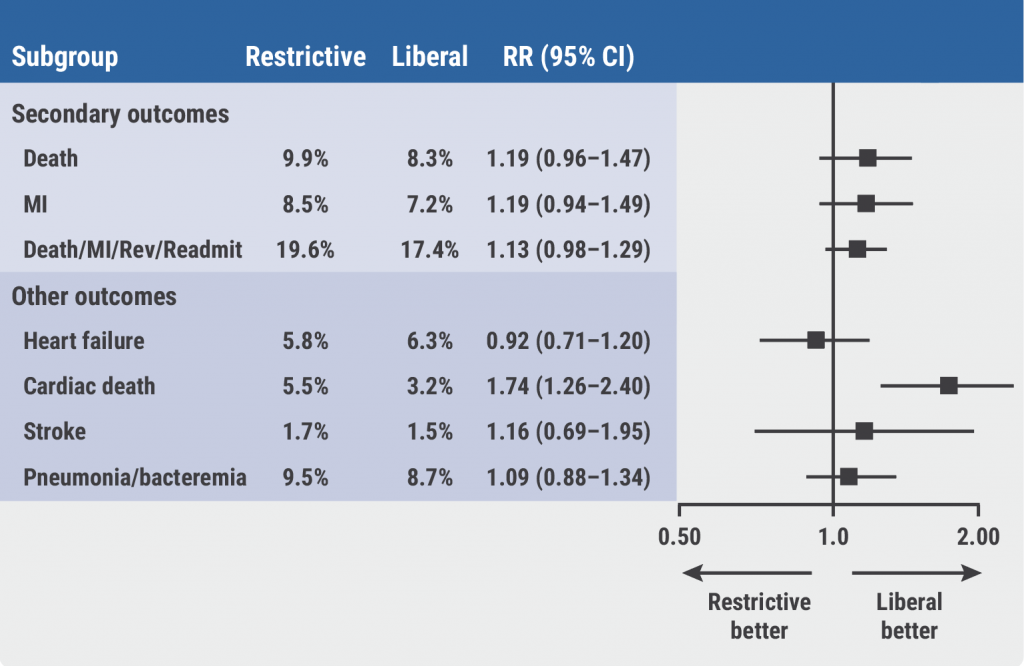The intervention also included increased physical activity by the participants, although this was not quantified, researchers note in JACC: Cardiovascular Imaging.
The single-center, randomized study included 89 patients (41% women) with mild angina symptoms and suspected coronary artery disease; their mean age was 60 and their BMI 29. Most had hypertension and/or dyslipidemia, but patients with diabetes or previous coronary-artery bypass grafts were excluded.
At baseline, most participants received an antiplatelet medication, a beta-blocker and/or a statin, and 31% received a calcium-channel blocker. The patients were randomized to receive dietary consultation and encouragement to increase their physical activity, as well as optimal medical therapy, or to receive the latter alone.
After body-composition testing, each patient in the intervention arm was assigned an individual DASH (Dietary Approaches to Stop Hypertension) nutrition plan of 1,600, 1,800, 2,000 or 2,600 calories per day.
In addition to stressing consumption of fruit, vegetables, whole grains, and low-fat dairy products, the DASH diet limits saturated fats, cholesterol, low-fiber cereal products with high glycemic index and sweets. Participants were encouraged to eat five meals a day, with less than three hours between each meal.
Dietary compliance was measured in part through a self-reported food diary. Similarly, patients were asked to categorize their physical activity as regular (at least three 30-minute sessions per week), irregular or none.
The number of patients reporting any leisure time physical activity and regular physical activity increased significantly from baseline in the intervention arm, but did not change in the control arm.
As measured by computed tomography angiography (CTA), percent atheroma volume increased significantly in the control arm (+1.1%), while there was no significant change in the intervention arm (+1.0%); the between-group difference was not significant, however.
Both groups saw significant reductions in noncalcified plaque, with significantly greater effect in the experimental group (-51.3 mm3 vs. -21.3 mm3, P=0.045). There was not difference in calcified plaque.
"DASH remains one of the most extensively studied nutritional models of proven benefit for arterial hypertension and reduction of cardiovascular risk," Dr. Cezary Kepka of the National Institute of Cardiology, in Warsaw, and colleagues write. "DASH is based on common foods, is nonrestrictive, and is relatively easy to follow, with adherence comparable to or better than that of the Mediterranean diet."
The results "show that a comprehensive lifestyle intervention embracing systematic dietary counseling and physical activity . . . may be effective in slowing the progression of atherosclerosis and decreasing plaque vulnerability" in patients with nonobstructive coronary atherosclerosis, the researchers say.
Dr. John C. Mathers, director of the Human Nutrition Research Centre at Newcastle University, Newcastle on Tyne, in England, told Reuters Health by email, "The DASH diet is a plant-based diet that is well-known for its beneficial effects on blood pressure, one of the risk factors for" cardiovascular disease (CVD).
The study's main strength, he continued, was "the attempt to investigate another potential mechanism through which the DASH diet may lower CVD risk," that is, the researchers' evaluation of the volume and composition of arterial plaques.
Overall, said Dr. Mathers, who was not involved in the worsk, "this new study provides some further information on the mechanisms through which a DASH-type diet may lower CVD risk by preventing progression of atherosclerotic plaques. Since the study intervention also encouraged participants to become more physically active but there was no objective measurement of physical activity, we cannot be sure whether any observed effects were due to the DASH diet, to being more physically active, or to a combination of both factors."
Dr. Kepka did not reply to a request for comment.
SOURCE: https://bit.ly/3o5IRVG JACC: Cardiovascular Imaging, online December 16, 2020.
By Scott Baltic
Posted on
Previous Article
« Monitoring hydroxychloroquine blood levels may help predict thrombosis risk in SLE Next Article
Magnesium and hydrogen may be neuroprotective in subarachnoid hemorrhage »
« Monitoring hydroxychloroquine blood levels may help predict thrombosis risk in SLE Next Article
Magnesium and hydrogen may be neuroprotective in subarachnoid hemorrhage »
Related Articles
June 15, 2022
COMPLETE revascularisation improves angina-related QoL


October 27, 2022
Medical therapy versus PCI for ischaemic cardiomyopathy
© 2024 Medicom Medical Publishers. All rights reserved. Terms and Conditions | Privacy Policy
HEAD OFFICE
Laarderhoogtweg 25
1101 EB Amsterdam
The Netherlands
T: +31 85 4012 560
E: publishers@medicom-publishers.com

